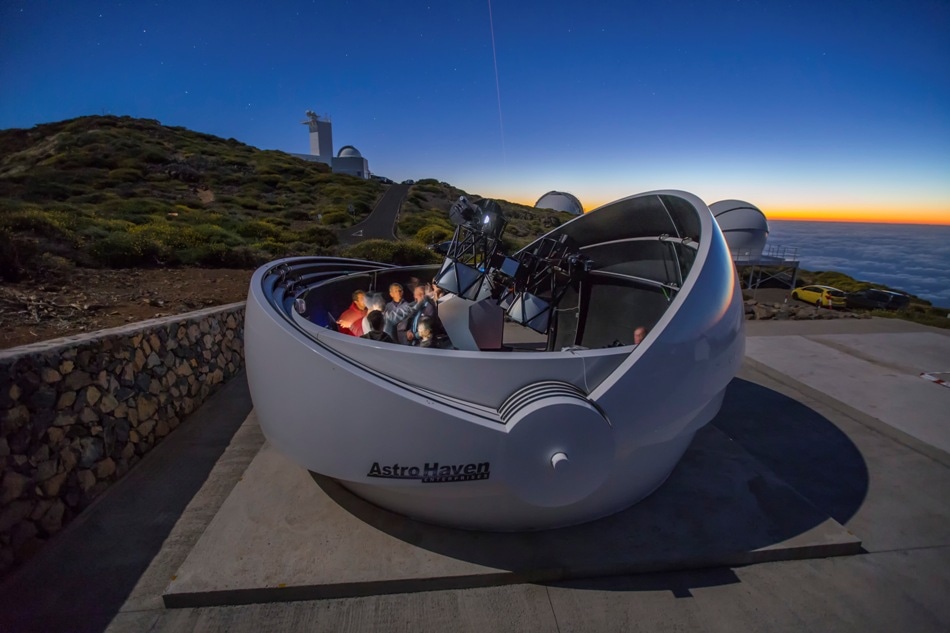Jul 5 2017
A sophisticated telescope for detecting optical signatures of gravitational waves - developed and operated by a global research partnership, headed by the University of Warwick - has been officially launched.
 The Gravitational-wave Optical Transient Observer (GOTO) (credit Antonio González / IAC)
The Gravitational-wave Optical Transient Observer (GOTO) (credit Antonio González / IAC)
On 3rd July 2017, the Gravitational-wave Optical Transient Observer (GOTO) was opened at Warwick’s astronomical observing facility in the Roque de los Muchachos Observatory of the Instituto de Astrofísica de Canarias on La Palma, Canary Islands.
GOTO is an autonomous, intelligent telescope, which will hunt for odd activity in the sky, based on alerts from gravitational wave detectors - such as the Advanced Laser Interferometer Gravitational-Wave Observatory (aLIGO), which in recent times secured the first direct detections of gravitational waves.
Gravitational waves are ripples in the fabric of space-time, formed when huge bodies – mainly neutron stars and black holes– orbit each other and unite at very high speeds.
These waves radiate through the Universe at the speed of light and investigating them brings in a new era in astrophysics, offering Astronomers critical clues regarding the bodies from which they originated – as well as longed-for insight into the characteristics of gravity itself.
Initially predicted about a century ago by Albert Einstein, they have just been directly detected in the last two years, and the subsequent challenge of Astronomers is to connect the signals from these waves with signatures in the electromagnetic spectrum, such as optical light.
This is GOTO’s specific aim: to find optical signatures linked with the gravitational waves as fast as possible, so that Astronomers can analyze these sources with various telescopes and satellites before they disappear.
GOTO is an important project for the Monash-Warwick Alliance, through which the building of the telescope was partly funded. The Alliance integrates the outstanding research and teaching capabilities of two leading Universities to meet the challenges of the 21st century.
After all the hard work put in by everyone, I am delighted to see the GOTO telescopes in operational mode at the Roque de los Muchachos observatory. We are all excited about the scientific opportunities it will provide.
Dr Danny Steeghs, Warwick’s Astronomy and Astrophysics Group
Dr. Duncan Galloway, from the School of Physics & Astronomy at Monash University, comments,“GOTO is very significant for the Monash Centre for Astrophysics. We’ve invested strongly in gravitational wave astronomy over the last few years, leading up to the first detection announced last year, and the telescope project represents a fundamentally new observational opportunity. It’s really satisfying seeing a research collaboration that we’ve build over many years coming to fruition in such an exciting way, and we couldn’t have got here without the support of the Alliance and the participating Universities.”
GOTO is the newest addition to the University of Warwick’s Astronomical facility at La Palma, which includes the SuperWASP Exoplanet discovery camera - the most effective ground-based exoplanet discovery project around.
GOTO is run on behalf of a consortium of institutions including the University of Warwick, Monash University, Leicester and Sheffield Universities, the Armagh Observatory and the National Astronomical Research Institute of Thailand (NARIT).
Professor Pam Thomas, the University of Warwick’s Pro-Vice-Chancellor (Research) was present at the inauguration ceremony.
La Palma is one of the world’s leading astronomical observing sites, due to the fact that it is the world’s steepest island and has less pollution – offering Researchers clear views of the sky.